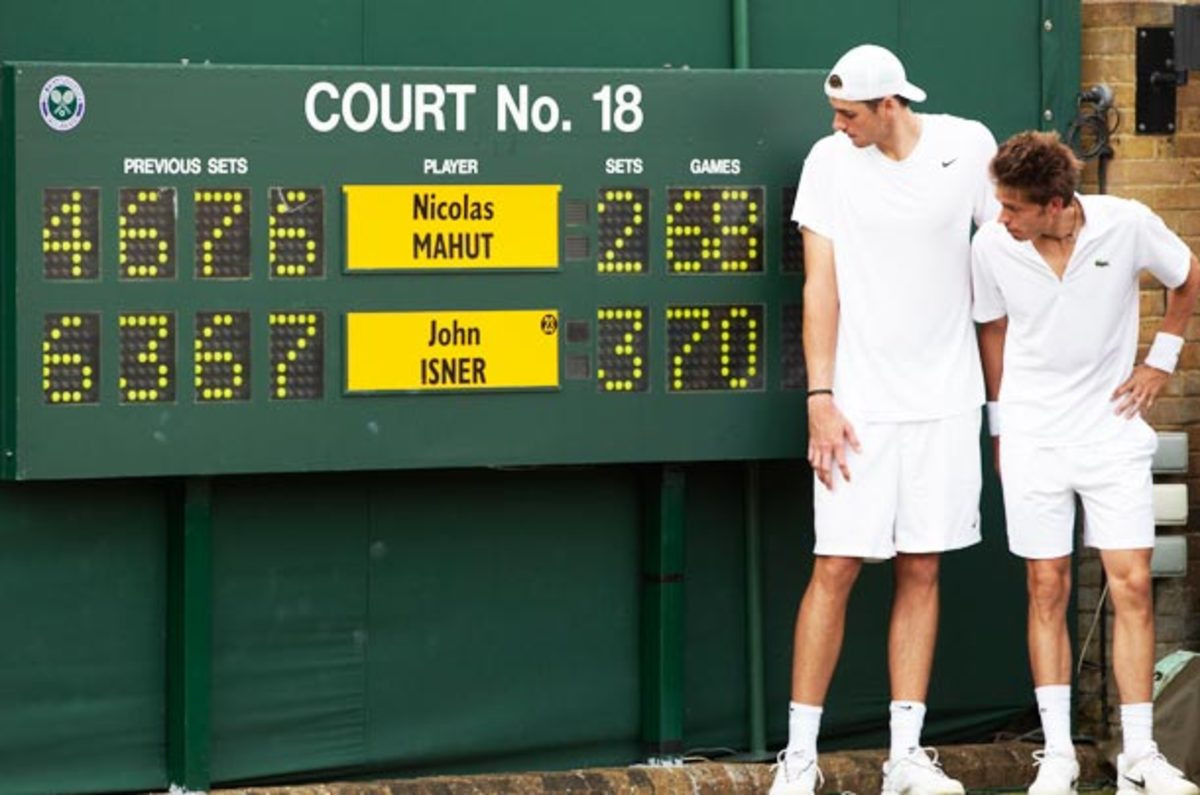The Toss: Final-set tiebreak, or win by two?
The U.S. Open is the only Grand Slam that uses a final-set tiebreak. A win-by-two format is used at the other Slams, which produced the John Isner-Nicolas Mahut 70-68 fifth set at 2010 Wimbledon. (Mike Powell/SI)
Last week we took a look at Arthur Ashe Stadium's night schedule and which matches should get tapped for prime time. According to our reader poll, 42 percent agree that U.S. Open schedulers should pick the most intriguing matchups to play on Ashe, while 35 percent think the biggest names should get the nod. Then again, 12 percent think they should pick from a hat, so take those results with a grain of salt.
Today's Toss: Should a final set in a U.S. Open match be decided by a tiebreak, or should a player have to win by two games like at the other three Grand Slam events?
C.W. Sesno, SI.com Tennis Producer: Tiebreak. Sure, a win-by-two format creates the possibility of a dramatic, never-ending match. Nobody will ever forget the John Isner-Nicolas Mahut Wimbledon match that stretched over three days and 11 hours and wrapped when Isner finally broke serve to win the final set 70-68. Andy Roddick's 16-14 loss to Roger Federer in the 2009 Wimbledon final also comes to mind as a great match needing extra games, as does Rafael Nadal’s 9-7 fifth-set win over Federer in that classic Wimbledon final in 2008.
But I say stick with the tiebreak. That's where true winners elevate their play. Every shot carries that do-or-die pressure, often creating a mix of long defensive rallies punctuated by the gutsy “here’s where I take it” mentality. The fans went nuts as Maria Kirilenko survived (thanks, HawkEye) to fight another set against Samantha Stosur on Sunday night with a 17-15 win in the second-set tiebreak. With Kirilenko down a set already, every shot, footstep and decision carried the added weight that it could be her last. So even more impressive was her display of moxie to still go for the lines and charge the net to scratch her way into the third set. How great would it have been had that tiebreaker been in the third set and both players faced the same win-or-go-home scenario?
Courtney Nguyen, Author of Beyond The Baseline: I'm all for the third-set tiebreak in Tour-level events, but there's just too much at stake in a Slam to let it be decided by a point here or a point there. It's why soccer fans can't stand matches being decided by penalty kicks and why doubles matches using a Champions tiebreak seems to lead to such arbitrary results. If Slams are going to be used as the standard by which we gauge the best players in the world, then we need to ensure that the matches are determined by skill, not luck.
[polldaddy poll=5481947]
Sesno: It's a stretch to say a tiebreak is determined by "luck." In fact, I'd say as much or more strategy goes into a tiebreak because of the importance on every shot. Isner could take a point or two off during service games in that marathon Wimbledon match, knowing he'll have a set number opportunities to blast serves. In a tiebreak, you have to be much more careful in picking your moments to paint the lines, make that extra run or let one go to preserve energy.
It’s tough to compare team sports to tennis. Soccer fans dislike PKs because they’re an entirely different element of the game, removing team strategy and altogether changing the way the outcome is determined. If we’re using soccer as an example, a tennis tiebreak is more like Golden Goal: same play, same players, different scoring.
Nguyen: But what about the question of fitness? Shouldn’t players be rewarded for being able to “out-fit” the other player? If a player has put in the hard yards and is able to outlast his or her opponent, I think he or she should be rewarded. That’s as much of a test of nerves and strategy as playing a tiebreak. Grand Slams are supposed to award consistency over the long haul. That’s why the men play three out of five.
I just find matches that end on a tiebreak far less satisfying than ones that end by two. When lower-ranked players beat top-ranked players in a tiebreak format, there’s more lingering doubt in my mind as to the “trueness” of the result. Perhaps that’s what my problem is (among many). I value the result more than I value the excitement of the match. I agree that final-set tiebreakers are tremendously exciting. When the players are living and dying by every single point, how can you possibly not get amped?
But if Grand Slams are supposed to be as important as we make them out to be, I want to eliminate as much uncertainty as possible from the equation. A shootout to seven to determine a Grand Slam champion (in the event of a final) just doesn’t sit well with me.
You decide: Vote in our poll above and sound off in the comments to let us know your thoughts!






